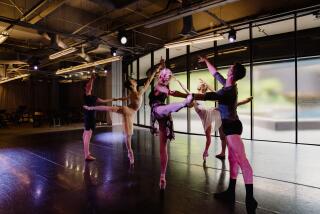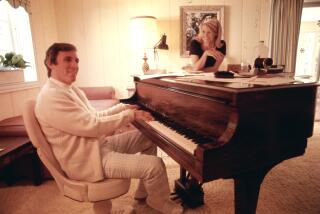On Songs, Singers and Cities
- Share via
\o7 NEW YORK\f7 — Terence Blanchard admits he didn’t do the right thing by showing up in L.A. Lakers garb when he started working with Spike Lee on the soundtrack to the 1988 film “School Daze.”
But Lee persuaded Blanchard to root for his favorite NBA team, the New York Knicks, and their relationship has been harmonious ever since.
The trumpeter was already a rising jazz star when Lee gave him the chance to write his first complete score for 1991’s “Jungle Fever.” Since then, Blanchard has written the scores for nearly all of Lee’s films, including “Malcolm X” and “Clockers.”
Blanchard, 39, has now written more than 30 TV and film scores.
Moreover, he’s demonstrated his versatility by composing a classical-style piano concerto for Samuel L. Jackson in “The Caveman’s Valentine” and an Afro-Cuban-inflected orchestral score for “Original Sin,” the Antonio Banderas-Angelina Jolie film.
Blanchard says his Hollywood career has enhanced his primary work as a jazz bandleader and composer. His 1999 orchestral CD, “Jazz in Film,” offered new interpretations of classic jazz-influenced scores from such films as “A Streetcar Named Desire” and “Taxi Driver.”
For his new CD, “Let’s Get Lost” (Sony Classical), Blanchard has put together a cast featuring his regular quintet and four leading jazz divas--Diana Krall, Dianne Reeves, Cassandra Wilson and Jane Monheit. It’s a romantic tribute to Jimmy McHugh, who’s been called “the most sung unsung” composer of the golden age of pop songwriting.
Blanchard, who returned to his native New Orleans in 1995 to be closer to his children after a divorce, launched a third career this month. He’s replaced mentor Ellis Marsalis, patriarch of the Marsalis family, as director of jazz studies at the University of New Orleans.
*
Question: Why did you record a CD entirely of Jimmy McHugh tunes?
Answer: I thought it would be a great idea to do some of Jimmy McHugh’s music because to me he ranks up there with the rest of the great American songwriters, but his name doesn’t seem to roll off your tongue like the others do....His compositions are like good fodder for jazz musicians because you have a great melody, great harmony and a great structure to manipulate.
*
Q: How did you match the singers to the songs?
A: Once we decided on some songs ... the music started to speak to me in terms of who was going to sing what. “I Can’t Give You Anything but Love” obviously was a great choice for Jane [Monheit] because I knew that I could do a lighter kind of arrangement to make it have more of a cute kind of sound. I started to hear “Let’s Get Lost” with a kind of medium-tempo swing thing and Diana Krall’s name just popped out.
With “I Can’t Believe That You’re in Love With Me,” I started to do this kind of Latin thing with it, and Dianne [Reeves] just seemed to be a natural fit because she has a passion for that music. “Don’t Blame Me” set up this kind of bluesy, slow swinging thing for me and I knew right away that would be really cool for Cassandra [Wilson].
*
Q: What’s the relationship between your jazz and film work?
A: Obviously the jazz career, understanding what improvisation is all about, has helped me immensely with my ability to make changes quickly in the studio when I’m recording a film. And the film career has definitely had an effect on my jazz writing. It has really helped me in terms of understanding what it’s like to keep certain things within the context of a story.
*
Q: How’s your relationship with Spike Lee?
A: He’s very comfortable with what I’ve been doing so far, which allows him to kind of relax and let me do my thing. While Spike’s very adamant about what he wants, he understands that I’m going to deliver on those things and he’s been really cool working with me. He’s made me stretch just by what he does visually sometimes.... And it makes you think differently about the music.
*
Q: What are some of your favorite things about living in New Orleans?
A: One of the things that I personally love about New Orleans is that it’s a crazy place. It has this quirky personality. You have a love-hate relationship with the city because it’s so far removed geographically from some things that it’s been allowed to exist kind of in its own world.
More to Read
The biggest entertainment stories
Get our big stories about Hollywood, film, television, music, arts, culture and more right in your inbox as soon as they publish.
You may occasionally receive promotional content from the Los Angeles Times.










